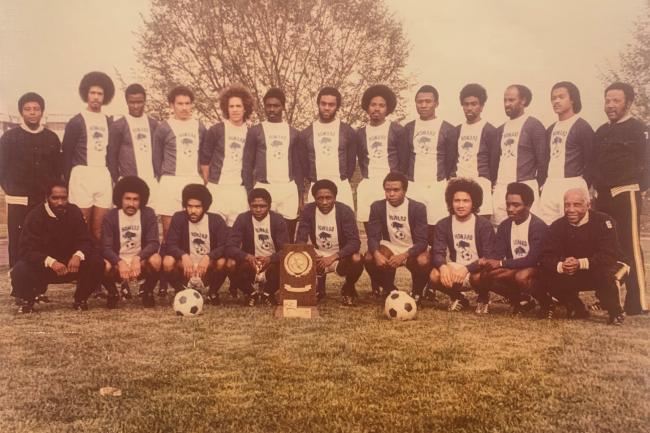This weekend, Howard University will commemorate the remarkable achievements of its 1974 men’s soccer team, which completed a flawless season and clinched the NCAA championship fifty years ago. A series of festivities are planned to honor the team’s legacy and impact on the university and the sport.

The celebration begins on Friday with the team’s induction into the Howard University Athletics Hall of Fame. Members of the historic team, along with their head coach, Lincoln Phillips, will gather for the ceremony, which runs from 4 to 7 p.m. at the Armour J. Blackburn Center Ballroom. Howard alumnus Rock Newman will emcee the event, with remarks from Shaka Hislop (BS ’92), a former Howard soccer player and current ESPN soccer analyst who played for the Bison from 1987 to 1991.
Phillips, who coached the Bison from 1970 to 1980, expressed immense pride in the team’s achievements. “To win a championship was one thing, but to do it without losing a game is something pretty amazing,” he said. “It’s an accomplishment that has never been equaled, and for that, I am both humbled and immensely proud.”
The Soccer Team’s Unmatched Legacy
The 1974 team’s perfect 19-0 record remains unmatched in college soccer history, solidifying its place in the annals of sports. In 2016, the documentary “Redemption Song” was released, which chronicled the journey of the 1971 championship team—the first historically Black college or university squad to win an NCAA national title. Although their title was later revoked due to player eligibility violations, the 1974 team’s triumph restored the program’s prestige and demonstrated resilience in the face of adversity.
Phillips emphasized the broader significance of the 1970s teams in promoting soccer within the D.C. community. During his tenure, he organized clinics that provided young people with opportunities to engage with the sport. His efforts cultivated a love for soccer at a time when it was not widely popular among Black communities.
“Back then, soccer was really a minor sport,” Phillips noted, reflecting on the game’s evolution since that era. “But now, it has grown so much, and so many people, including Black people, appreciate the game. What we were doing back in the 1970s was really setting the groundwork for the game to become what it is for our people.”
The weekend culminates on Sunday with a special dinner honoring the team. This dinner will reinforce the lasting legacy of one of the most acclaimed teams in collegiate athletics.



